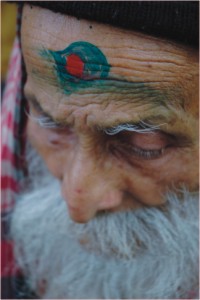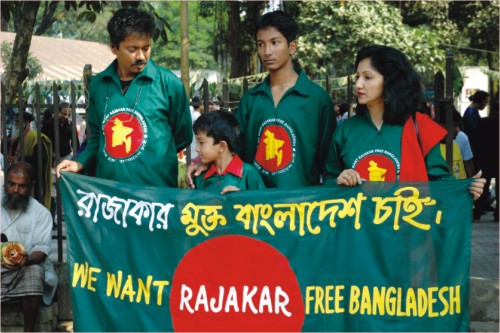
Inside
|
Bangla Democracy Manzurul Mannan reflects on the complications and intricacies of Bangladesh's political landscape The ongoing process of dialogue and negotiation initiated by the caretaker government for consensus building towards re-establishing a democratic government seems to have a paradox at its root. This caretaker government came into the picture because the main political parties oppose each other with deep distrust, making the country vulnerable. Once the caretaker government has enjoyed the relative confidence of the people and repaired the porous democratic system, its aim is to hold a free and fair election. However, this might hand the baton of democracy back to the same politicians who were responsible for making democracy dysfunctional in the first place. The present political system contains elements that work to destroy it. This happens largely because we have inherited a political and economic system that has not been adapted to fit our post-colonial cultural and political reality. This invites an examination of the underlying social and cultural dynamics which determine the political process. Our ruling classes and elite import Western concepts and models of democracy, pluralism, and universalism to justify their political existence. Yet, these imported concepts are continuously redefined and reshaped by cultural and religious values handed down by the hierarchy and the rule of elders. The irreversible consequence is that the political diversities and differences have created a sort of dynamic wherein politicians fail to rationalise their ideas into an appropriate symbolic structure and the consensus required for democracy to flower. Modern Bengalis typically accommodate three competing values in their persona: Western universalism, Islamic hierarchical values, and Bengali holism. These competing value systems spawn a process which fails to nurture and value the pluralism required for ideational consensus. Ideational consensus implies the acceptance of a common symbol structure, i.e. agreement on not only broad principles but also on the terms in which these principles are expressed, to establish a pluralistic society built on several competing value systems. There are at least three competing tendencies that deter the development of a common symbolic structure in the post-colonial state and society in Bangladesh. Firstly, the colonial institutions, and the rules and regulations adopted to run the country, may be inappropriate to capture the imperatives of the post-colonial state and its economic realities. Secondly, there is a tendency to reach consensus among the ruling classes for establishing democracy, nationhood, and the state, against the counter-tendency among the masses who might think otherwise. Finally, the formation of a government by political parties in democratic politics de-emphasises the notion of state and democratic institutions, but places importance on the reproduction of kinship and loyalty as a lever for governance. The political canvas of Bangladesh is a mismatch between three layers of governance, which fail to result in ideational consensus and symbolic form as a competitive value system. The first layer revolves around the problem of developing symbolic consensus amid low levels of public trust. The recent Brac Institute of Governance Studies report shows that people trust teachers and distrust politicians. The unfortunate reality of Bangladeshi politics is that it comprises a democratic system that is managed by politicians in whom people have little faith, while teachers' opinions are ignored. This deep distrust towards politicians may explain the apparently non-antagonistic attitude of the people towards the present caretaker government, despite the rice price crisis and ongoing economic hardship. Even though people are unhappy with the economic performance of the government, tacit support for it stems from the fact that they see the present government as a moral one. The events of January 11, 2007, are broadly construed by many as the "1/11 which destroyed the twin towers of two political families." This caretaker government contributes to promoting the image of a "moral government" against all the "corrupt governments" of the past. This moral government is comprised of a group of educated leaders, an unprecedented phenomenon in our history of governance. However, this Western-centric ruling elite harnesses values which combine an age-old peasant morality with the ethics of global capitalism. The outcome is reflected in its aspiration for a consensus government which informs two aspects of political reality. In the first place, Bangladesh is failing to create political and symbolic consensus by strengthening the democratic institutions with the "rule of law." People entrust politicians to do this job. The basic institutions are crumbling because of the policies of political parties, which try to establish party supremacy through "rule of loyalty" over rule of law. In the second place, the sentiment for consensus contains an anti-institutional element as it envisions a "father figure," allowing people to think in a reverse order to reproduce the hierarchical characteristics of village-societies in modern institutions. The aspiration for collective consciousness enables people to select, not elect, their social elders as leaders. This could be one reason why the caretaker government, which is not elected but is appointed by the president, quickly becomes popular. The second layer deals with an accommodation of the interests of the rising economic and political classes, which are entrenched in the system of global capitalism. Capitalism is flourishing with three competing classes, who demand that their rights be accommodated into the political system. These classes are family capitalism, market capitalism and development capitalism. Indeed, it is the conflicts between them that make the system inoperative. Family capitalism Market capitalism Development capitalism The third layer is the institutional military-bureaucratic oligarchy. Historically, Bangladesh has inherited an overdeveloped military-bureaucratic oligarchy in relation to classes. Although politicians are successful in manipulating the civil bureaucratic oligarchy, they hardly understand the nature of military oligarchy.
Time and again, despite harsh criticism and opposition, the military oligarchy has appeared as the "saviour" of the democratic system. This occurred in 1975, in 1981 and again in 2007. This oligarchy is good for short-term governance, but falters in the long run. At present, it seems that this ruling oligarchy is re-engineering the political system with an eye to neutralising the family capitalism, if not the market and development capitalism. Although this oligarchy enjoys a sound state budget, enabling it to maintain a relatively corruption-free and disciplined organisation, it now is behaving like a market actor as it earns foreign exchange by selling its expertise in the global peace market. The present system clearly fails to accommodate the diverse ideological and economic interests of competing classes and oligarchy. Rather, it allows one class to grow at the expense of others. The outcome is the fragmentation of the political system to control institutions and classes in post-colonial Bangladesh. Over the years, the country has seen the political elite working to destroy discipline, rules, and constitutions during times of peace; while in times of crisis, especially in opposition to military-bureaucratic oligarchy, the same elite vows to establish democracy. These cycles occur at regular intervals. Politicians are removed by the military, and then the military is removed by politicians. Everything takes place in the name of democracy. We should also not overlook our cultural behaviour. Most modern educated leaders behave like village heads. Our post-colonial misery lies not in our inability to think out new forms of the modern community and systems, but in our surrender to the old forms of the modern state.
The solution lies in a new form of government with new institutional adjustments accommodating competing interests and actors. Only open national dialogue, debate, and analysis of our problems can give direction to our future political discourse. Otherwise, we will cause the erosion of whatever form of government we adopt. Photos: Amirul Rajiv Manzurul Mannan teaches Anthropology and Development at Independent University, Bangladesh. |


